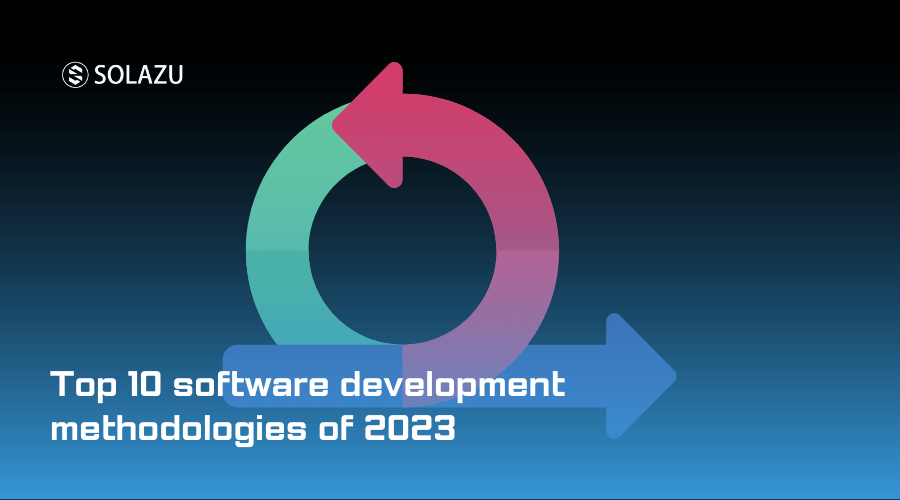Software development methodologies refer to the process by which software is designed, created, tested, and deployed. There are numerous methodologies that developers use to create software, each with its unique features, advantages, and disadvantages. Over the years, software development methodologies have evolved, and new ones have emerged. In this article, we will highlight the top 10 software development methodologies of 2023.
1. Agile Methodology
Agile is one of the most popular software development methodologies used today. The Agile methodology is based on the idea of iterative and incremental development, which means that software is developed in small increments, with each iteration building on the previous one. The main advantage of Agile is that it allows for flexibility and adaptability, which is essential in the fast-paced world of software development. Agile also encourages collaboration and communication between developers and stakeholders, which helps to ensure that the final product meets the customer’s needs.
2. DevOps
DevOps is a software development methodology that combines development and operations to create a continuous delivery pipeline. The DevOps methodology focuses on delivering high-quality software at a faster rate, with a focus on automation, collaboration, and monitoring. The DevOps methodology also encourages a culture of continuous improvement, with a focus on feedback and learning from mistakes.
3. Scrum
Scrum is a popular Agile methodology that is widely used in software development. The Scrum methodology focuses on delivering software in small increments, with each iteration building on the previous one. The Scrum methodology also encourages collaboration between developers, stakeholders, and customers, with a focus on transparency, communication, and continuous improvement.
4. Waterfall
The Waterfall methodology is a linear and sequential approach to software development, with each phase of the development process following the previous one. The Waterfall methodology is highly structured and requires detailed planning, with each phase of the development process being completed before moving on to the next one. The main advantage of the Waterfall methodology is that it provides a clear and defined process, which is essential in large-scale software development projects.
5. Lean
The Lean methodology is a software development methodology that focuses on delivering software quickly and efficiently, with a focus on eliminating waste and improving efficiency. The Lean methodology is based on the idea of continuous improvement, with a focus on creating value for the customer. The Lean methodology also encourages collaboration between developers, stakeholders, and customers, with a focus on feedback and learning from mistakes.
6. Kanban
Kanban is a visual methodology that is widely used in software development. The Kanban methodology is based on the idea of a visual board that tracks the progress of the development process. The Kanban methodology encourages collaboration between developers and stakeholders, with a focus on transparency, communication, and continuous improvement.
7. Rapid Application Development (RAD)
Rapid Application Development (RAD) is a software development methodology that focuses on delivering software quickly and efficiently, with a focus on rapid prototyping and iterative development. The RAD methodology is highly flexible and encourages collaboration between developers and stakeholders, with a focus on feedback and learning from mistakes.
8. Extreme Programming (XP)
Extreme Programming (XP) is an Agile methodology that is focused on delivering high-quality software at a fast pace. The XP methodology is based on the idea of continuous testing, with a focus on automated testing and continuous feedback. The XP methodology also encourages collaboration between developers and stakeholders, with a focus on transparency, communication, and continuous improvement.
9. Feature Driven Development (FDD)
Feature Driven Development (FDD) is an agile software development methodology that is focused on building features incrementally. FDD is based on five basic activities: developing an overall model, building a feature list, planning by feature, designing by feature, and building by feature. This approach allows development teams to focus on delivering value quickly by building features that provide tangible benefits to end-users.
10. Behavior Driven Development (BDD)
Behavior Driven Development (BDD) is a software development methodology that focuses on the behavior of the system. This approach allows developers to write more detailed specifications that describe the expected behavior of the system in a language that both developers and non-developers can understand. BDD involves collaboration between developers, testers, and business stakeholders to ensure that the system is being built in a way that meets the business requirements.
In conclusion, there are numerous software development methodologies available to choose from, and each has its own unique strengths and weaknesses. Selecting the right methodology for your project is crucial to its success, and should be based on your team’s skills, project requirements, and organizational culture. Whether you opt for a traditional, Waterfall approach, or a more modern, Agile methodology, be sure to follow best practices, remain flexible, and focus on delivering value to your end-users.
